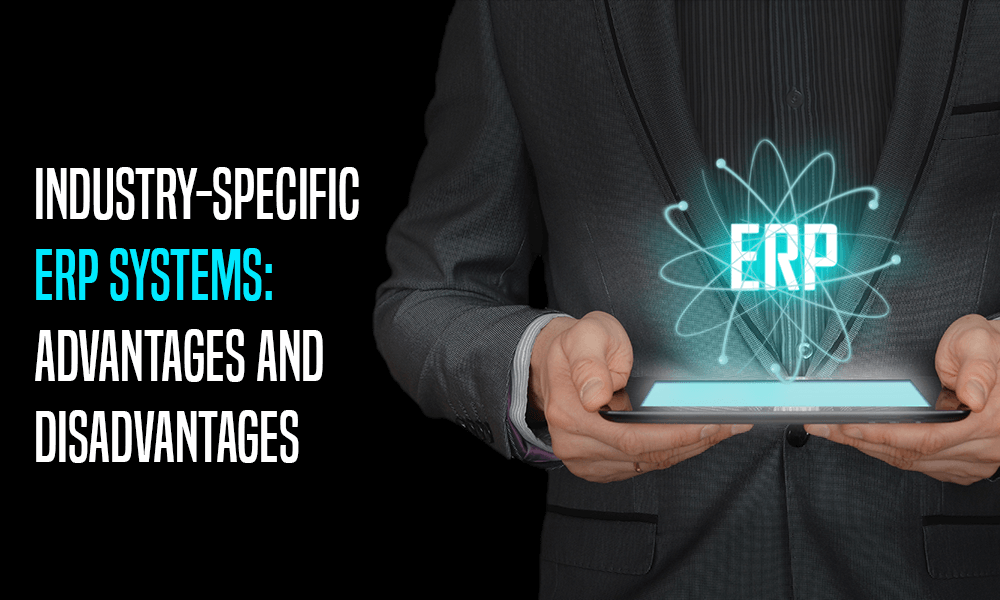Enterprise Resource Planning (ERP) systems offer a broad range of functionalities and solutions applicable to businesses from diverse backgrounds. ERP software is not limited to one or two industries; it is adaptable to a broad range of industries, ensuring ease of executing business specific processes.
However, one common question arises: Does it only foster growth? Or does it have some cons, too?
Explore in this blog some of the significant advantages and disadvantages of industry-specific ERP systems and how SourcePro ERP solution is capable of meeting the unique needs of different verticals.
Advantages of Industry-Specific ERP Systems:
1. Tailored Functionality:
ERP systems can be customized to be industry-specific. This means to work better with the nuances of a particular industry, certain ERP software is equipped with features designed specifically to meet business challenges.
2. Increased Efficiency:
ERP software helps a business improve operational efficiency by eliminating unnecessary functionalities and streamlining processes by focusing on industry-specific needs. This tailored approach allows businesses to optimize workflows and enhance productivity.
3. Compliance and Regulations:
Different industries are subject to specific regulation and compliance standards. Some ERP software integrate these industry vertical requirements, which enables businesses to adhere to industry-specific regulations without needing extensive customization.
4. Enhanced Reporting and Analytics:
Be it large or medium-scale industry reports, performance analysis, and data analysis are key factors in running the business successfully.
Industry-specific ERP solutions typically include pre-built reports and analytics tailored to the key performance indicators relevant to that sector. This gives insightful data analytics to businesses, enabling informed decision-making and strategic planning.
5. Scalability and Flexibility:
ERP systems are scalable. They are designed to grow with your business. It provides versatile solutions that can adapt to the changing needs of your industry with time.
Disadvantages of Industry-Specific ERP Systems:
1. Limited Versatility:
ERP software is designed for specific industries. Hence, they excel in catering to the specific needs of a particular business front.
They may lack the versatility of generic ERP solutions, which means if a company is engaged in diverse business spanning multiple business verticals, they would have to install various ERP systems catering to that particular industry.
2. Higher Implementation Costs:
While an ERP system is an investment for a company, implementing the system can be quite expensive. It is so because of their specialized nature and the need for tailored modules.
However, businesses should consider the long-term benefits and return on investment these solutions can offer in terms of efficiency and productivity gains.
Unveiling SourcePro’s Commitment to Industry-Specific ERP Systems
While generic ERP solutions serve many organizations well, industries with unique demands require specialized systems to optimize processes and enhance overall performance. This is where the SourcePro expertise comes in.
We at SourcePro provide ERP solutions for diverse and unique sectors, ranging from manufacturing to FMCG, automotive, and foundry industries.
In the manufacturing sector, precision and coordination are paramount. SourcePro ERP system for manufacturing excels in seamlessly integrating with production workflows and supply chain management.
By providing a comprehensive solution that tracks every aspect of the production cycle, i.e., raw material procurement to final product delivery, we ensure that businesses in the manufacturing space operate with unparalleled efficiency.
The FMCG industry is a fast-paced consumer goods industry. Our ERP for FMCG features real-time insights, demand forecasting, and advanced inventory management tools.
With its adaptability and agility, FMCG businesses can effectively respond to market shifts, manage complex distribution networks, and stay ahead in the competitive landscape.
We do not stop here; we cater specialized ERP solutions to unique industries, such as the foundry industry.
These industries face unique challenges, such as managing complex production schedules and handling varying material specifications. For the foundry industry, our ERP addresses the intricacies of casting processes, promoting efficient resource allocation, reducing waste, and enhancing overall productivity of foundries.
Also, SourcePro ERP for the automotive industry is synonymous with efficiency. Our ERP solution accelerates operations by optimizing supply chain processes, production planning, and quality control. By facilitating streamlined processes and improving collaboration across teams, our ERP system empowers automotive businesses to gain a competitive edge, ensuring they can adapt swiftly to market trends and remain at the forefront of innovation.
In conclusion, choosing the right ERP system is critical for businesses seeking operational excellence.
SourcePro ERP, with its industry-specific features, strikes a balance between tailored functionality and versatility. Our ERP system provides the tools to optimize operation, improve decision-making, and drive sustainable growth.
However, after careful consideration of the advantages and disadvantages, the companies must make informed decisions to choose an ERP that aligns with their unique requirements.
